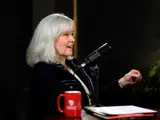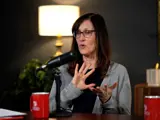What Is Palliative Care?
Hospice and Palliative Care Explained - Taking Care of the Mind, Body, & Spirit

Meet Your Host
Dr. Annemarie Dowling-Castronovo
Dean of the School of Nursing; Professor of Nursing; Director of Graduate Nursing Programs
At Roberts Wesleyan University, I have the honor of working alongside deeply compassionate clinicians and educators who are shaping the next generation of nurses, social workers, and healthcare providers.
In this conversation, I sat down with three trusted friends and colleagues. We talked about what palliative and hospice care really mean, and what we’ve each learned from walking with patients and families in their most vulnerable moments.
This article is based on a recorded conversation. While the insights and experiences shared are theirs, the wording has been edited for clarity and flow.

Dr. Jonathan Steiner
Hospice and Palliative Medicine, Unity Hospice

Dr. Jennifer Tuttle
Director of Roberts' Family Nurse Practitioner Program; Assistant Professor of Nursing

Professor Rebecca Draper
Associate Professor of Social Work
What is palliative care?
Dr. Steiner: Palliative care is really a focus on quality of life and symptoms. That’s at any time of a serious illness, from the beginning up to the end of life.
Dr. Dowling-Castronovo: Palliative care isn’t about giving up. It’s about living well through serious illness.
It can begin at diagnosis and follow someone through the course of their disease. Whether curable, chronic, or terminal, palliative care helps patients manage symptoms, navigate decisions, and focus on what matters most.
Hospice is one part of that. It’s the final chapter, not the whole story.
Professor Tuttle: Palliative care is care of symptoms at any point. Hospice falls underneath that umbrella.
It’s a very specific time at the end of life. With a six-month or less prognosis, hospice services can be initiated. The time frame is prescribed.
Dr. Draper: We help families understand that palliative care doesn’t mean giving up hope or stopping treatments. It is about the quality of life. You can still be looking for a cure, still be looking for healing.
What kinds of conditions or diagnoses fall under palliative care?
Dr. Dowling-Castronovo: Anyone with a serious illness (something life-limiting and symptom-producing) can benefit. And that includes chronic conditions like COPD, heart failure, kidney disease, and dementia.
So many patients I’ve worked with assume they have to be dying of cancer to receive palliative care. That couldn’t be further from the truth.
Dr. Steiner: I’d include Alzheimer’s, dementia, some neurologic conditions (toward the end of progression), multiple sclerosis, and others.
Professor Tuttle: I think really anything that’s life-limiting and also that has a symptom burden associated with that.
What patient story taught you the most?
Dr. Dowling-Castronovo: One patient I’ll never forget had been labeled a drug-seeker until we dug into his case. He had untreated pain, limited mobility, and complex needs. We helped him get the support he needed, and over the years, we saw how palliative care not only improved his quality of life, but it may have extended it.
His story taught me that with dignity, advocacy, and persistence, healing happens in ways we can’t always measure.
Dr. Steiner: I had this hospice patient once. He was passing away and facing the end of life. For him and his family, their biggest concern was their child. You know, how are things going to turn out for them? Are they going to be okay?
For context, my father passed away when I was a kid and about the same age as their child. So I usually keep things professional. I don’t talk too much about my own personal life, but I really felt like it was an opportunity that needed to be shared. So, we had a lot of emotions after talking about that. And they were at so much peace afterward.
We all acknowledged that God had brought us together specifically for that time and gave us a lot of peace. That’s something I’ll never forget.
That helped me show that being a physician isn’t just keeping things professional... There needs to be some involvement. That helped free me up to be more personable, to share my faith a little more. That’s how I practice. That’s who I am. Trying to separate those two is impossible.
Professor Tuttle: There was a younger gentleman admitted to our inpatient hospice unit. He had throat cancer and a fistula between his esophagus and his lung. Anything he ate or drank went through to the chest tube and out. This was a big deal to care for.
His one hope, his one desire, was to go home. Everyone looked at him and said, “No way, we cannot care for you at home.” His wife looked at me and said, “Is there any way?” I said, “Let’s figure it out.”
I got our team together - social work, provider, nursing - and we talked about a plan for transitioning him home. After a weekend of the wife providing all of his care, training with the nurses, learning how to turn him, what to do in an emergency, how to deal with medications…
We sent him home. He was home for two weeks. He got his wish.
The day he passed, his daughter called. She said, “I think it’s time. I need to know how to use that medication again.” I said, “Okay, I can help you.” He passed at home, surrounded by his family and friends.
His daughter came in a week later and said, “Thank you so much for thinking we could do this at home. It was the most important thing we could have done for our dad.”
He taught me that we have to be able to think outside the box to provide every opportunity for the quality of life the patient desires.
What does palliative care offer at the point of major medical decisions?
Professor Tuttle: Quality of life changes throughout a disease process. Why not have extra support to talk about those changes?
Too often, people get treatments without knowing what life will look like in five or ten years. We help them talk about expectations.
Wondering can be the worst. At least we can help them have a plan.
Dr. Dowling-Castronovo: I often use the example of end-stage kidney disease. The point when dialysis enters the conversation can be overwhelming. Palliative care helps them weigh their choices - not just medically, but emotionally, spiritually, and relationally.
We support the person, not just the illness.
What happens when patients or families are first offered hospice?
Dr. Dowling-Castronovo: That moment is tender. Some are afraid. Some are ready. Our job is to listen, guide, and help them find their own path. Hospice is about comfort, dignity, and time together.
Professor Tuttle: There can be hesitation or worry that signing on to hospice means giving up. But it’s just a change in philosophy, from curative interventions to making people comfortable and making the most of the time they have.
Dr. Steiner: You might think people will be heartbroken... but they might be relieved.
How do you create space for difficult conversations?
Dr. Dowling-Castronovo: One of the most sacred things we do in palliative care is hold space. In the middle of hospital chaos, or after years of silence in a family, we create a pause. And in that pause, truth and trust can emerge.
People deserve the truth. It can be hard to hear, but it’s even harder not to know. And patients almost always know when something is being left unsaid.
It starts with time. Presence. Listening. We’re not rushing in and out. We’re sitting down and staying a while. Sometimes, just being a new face in the room is enough to shift the dynamic.
Dr. Steiner: I think a big part is meeting people where they’re at and just asking open-ended questions. I found that by doing that, they’ll say what they’re really thinking, even if they don’t realize it. And we can just pick up those cues.
I found that sometimes when there’s the most chaos, having those conversations, even though there might be some distress or hesitancy at first… as soon as that conversation starts, it’s kind of like a flood. And they just want to hear more.
Even if it might not be news that people want to hear, a lot of times I’ve been thanked for giving very difficult news. They say things like, “I keep doing this treatment, and I don’t know if I’m getting better or not… now I know. I can plan around this.”
Dr. Draper: Honesty is so important because patients are not blind to the truth. They know things are happening. Oftentimes, they walk away from providers thinking, “There’s something happening, but no one’s really saying it.”
Once they can be with a team who can lay it all out - here are your options, here’s what’s happening - trust can happen easily. I’m not saying that providers are purposely not telling them things, but their focus is different than a palliative team who can put it all out there and talk about it.
Professor Tuttle: I would say in palliative care, we’re well suited for that. We’re that extra layer. We’re coming in for the support and for education, and we’re not necessarily talking about curative processes and things. So it’s a different interaction with patients and their families.
It’s the proverbial elephant in the room. We bring the elephant out, give it a name, and talk about it openly. Although difficult, we’re comfortable in those situations. I frequently ask permission to share what I have to say, to give them that option. Giving them control over the conversation is important.
I think people are called to hospice and palliative care. In that calling, we have certain gifts that allow us to be present, to be open, to have these conversations. That helps with trust forming.


About the author
Annemarie Dowling-Castronovo
Dr. Annemarie Dowling-Castronovo is a nationally recognized nurse educator and practitioner, board-certified in gerontological and palliative care. As dean of the School of Nursing at Roberts Wesleyan University, she leads a team committed to advancing whole-person care through Christ-centered education.
She brings over 20 years of clinical and academic leadership, including previous roles as department chair and chief academic nursing officer at Monmouth University. Her research on care for older adults has been published in top journals and honored by the National Academies of Practice.
Dowling-Castronovo holds degrees from the College of Staten Island, NYU, and Rutgers. She is passionate about preparing nurses to lead with competence, compassion, and courage.